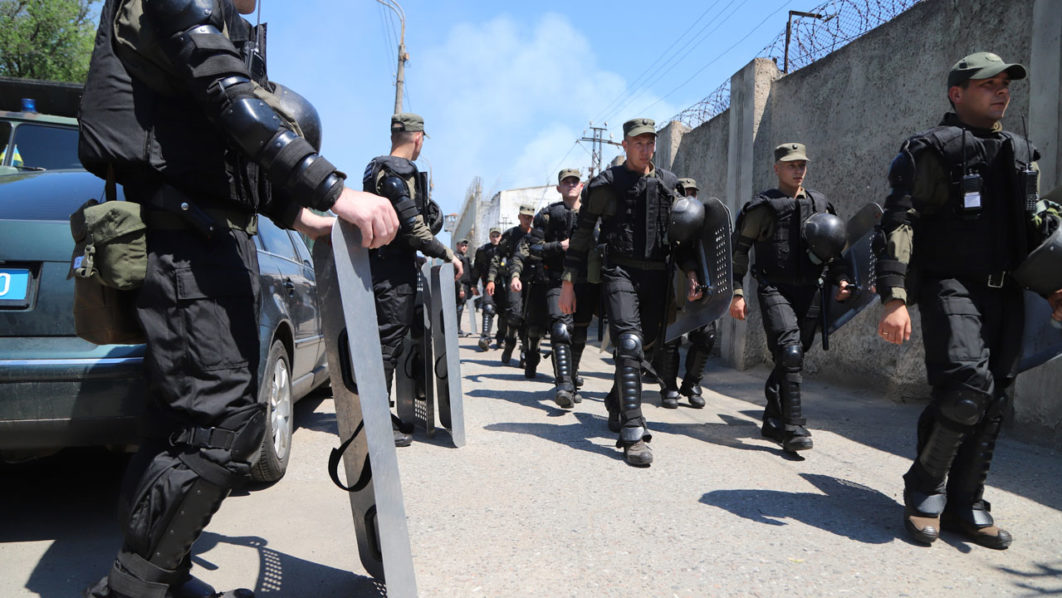 |
| Ukrainian National Guard arrive at a penal colony during riots inside, in the southern city of Odessa on May 27, 2019. – Seven employees of the penitentiary colony n°51 in Odessa, southern Ukraine, were injured in a riot involving nearly 500 prisoners, authorities said on May 27. The mutineers “attacked and injured seven employees”, setting fire to a fire engine and several premises, said in a statement the Ukrainian Prison Service, without specifying whether or not the wounded were prison guards. (Photo by Aleksandr GIMANOV / AFP) |
A major riot involving 500 prisoners broke out at a penitentiary in the Ukrainian city of Odessa on Monday with the inmates setting fire to buildings and wounding seven staff members, officials said.
Authorities deployed several hundred National Guard troops and police to help put down the riot, an AFP photographer at the scene said.
The violence broke out at the facility in the Black Sea port city as authorities planned to move several convicts to a different prison, officials said, adding that the situation was now under control.
Prisoners “attacked and wounded seven employees” and set alight a fire engine and several areas including the prison library, Ukraine’s prison service said.
Ruslan Forostyak, a regional police spokesman, told AFP that the rioters barricaded themselves inside their living quarters.
The country’s rights ombudswoman, Lyudmyla Denisova, said the rioters also took three medics and three guards hostage, but later said on Facebook,”they have been freed”.
“The situation is under police control right now,” she said.
At least six men who had arrived at the scene to support the prisoners were detained, according to the AFP photographer.
A law enforcement source told local media that one of the reasons for the riot was the poor quality of food.
Prison squalor
Established in the 1960s when Ukraine was part of the Soviet Union, the prison, Penal Colony No. 51, can hold up to 1,500 convicts.
Largely inherited from the Soviet era, Ukraine’s prisons are notorious for their squalor. There are currently 57,000 inmates in around 140 prisons.
The historic port of Odessa is a multi-ethnic city of just under one million people.
The city saw a number of riots in the past, especially in the early 20th century.
In June 1905, the sailors of Battleship Potemkin revolted over bad meat, took control of the vessel and sailed to Odessa as the city saw widespread protests against Tsar Nicolas II.
The incident was immortalised in Sergei Eisenstein’s film “Battleship Potemkin”.
Authorities deployed several hundred National Guard troops and police to help put down the riot, an AFP photographer at the scene said.
The violence broke out at the facility in the Black Sea port city as authorities planned to move several convicts to a different prison, officials said, adding that the situation was now under control.
Prisoners “attacked and wounded seven employees” and set alight a fire engine and several areas including the prison library, Ukraine’s prison service said.
Ruslan Forostyak, a regional police spokesman, told AFP that the rioters barricaded themselves inside their living quarters.
The country’s rights ombudswoman, Lyudmyla Denisova, said the rioters also took three medics and three guards hostage, but later said on Facebook,”they have been freed”.
“The situation is under police control right now,” she said.
At least six men who had arrived at the scene to support the prisoners were detained, according to the AFP photographer.
A law enforcement source told local media that one of the reasons for the riot was the poor quality of food.
Prison squalor
Established in the 1960s when Ukraine was part of the Soviet Union, the prison, Penal Colony No. 51, can hold up to 1,500 convicts.
Largely inherited from the Soviet era, Ukraine’s prisons are notorious for their squalor. There are currently 57,000 inmates in around 140 prisons.
The historic port of Odessa is a multi-ethnic city of just under one million people.
The city saw a number of riots in the past, especially in the early 20th century.
In June 1905, the sailors of Battleship Potemkin revolted over bad meat, took control of the vessel and sailed to Odessa as the city saw widespread protests against Tsar Nicolas II.
The incident was immortalised in Sergei Eisenstein’s film “Battleship Potemkin”.
AFP
In this article:
